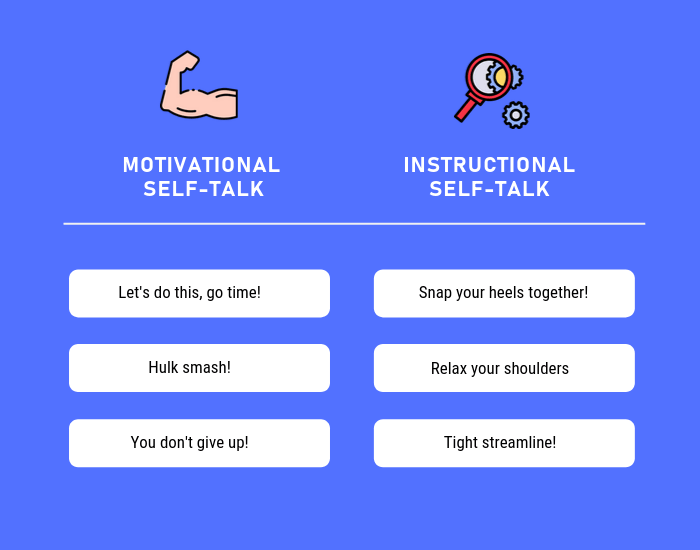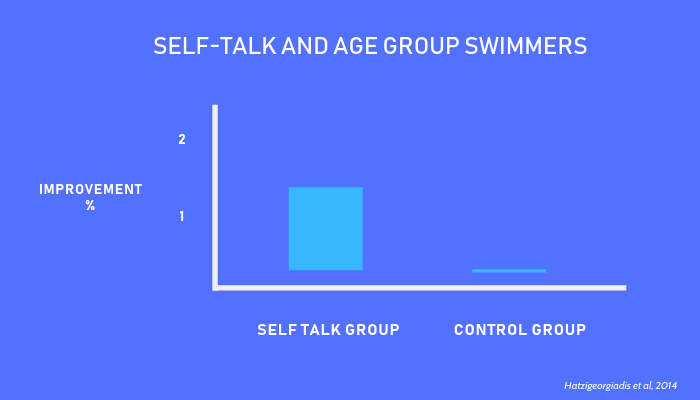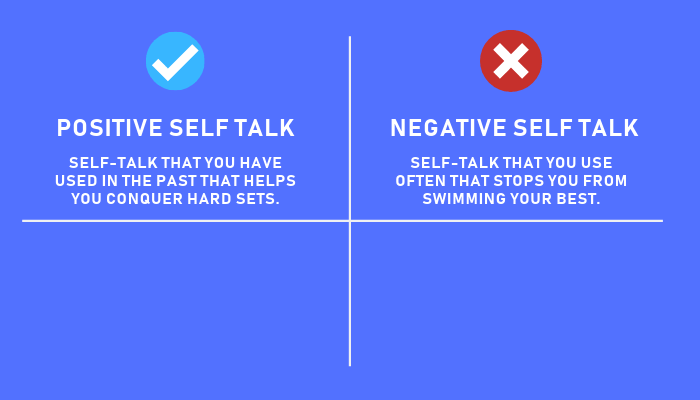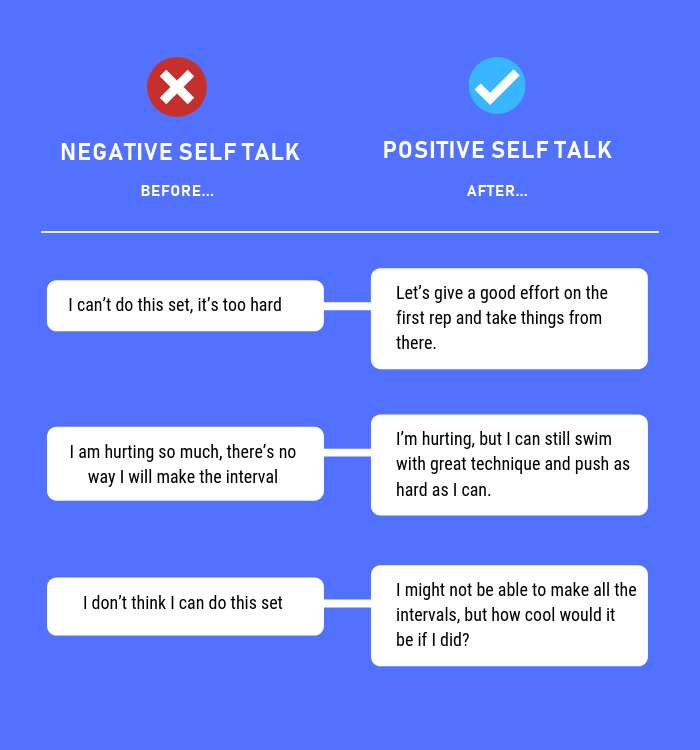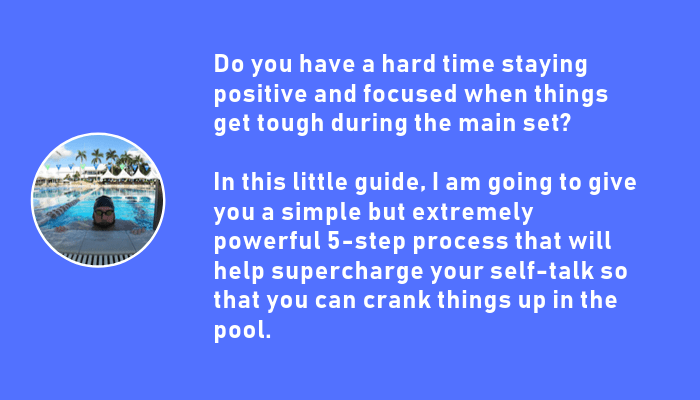
The main set is designed to push you.
To take you to the limit.
(And maybe further.)
So it’s understandable that getting pushed into the unknown, to where we are guaranteed to feel some serious discomfort, is gonna make us feel a little, well, antsy.
I can’t do this. This is gonna hurt so much.
Yep, it’s supposed to.
And that’s okay.
Being able to conquer those tough sets requires the ability to navigate the negative thoughts and self-talk that put three XXL parachutes on our effort, stopping us dead in our chlorinated tracks.
Here’s how.
The Gong-show Power of Self-talk
The language you use with yourself is going to decide how you swim each day at practice, how calm or wired you are on race day, and whether you are going to give up when things get tough.
It’s that important.
One study took a team of experienced age group swimmers, average of 14 years, and had half of them do a ten-week self-talk intervention.
The swimmers were instructed in how to use both types of self-talk.
There is instructional self-talk, which is best for fixing and improving your technique. The other kind, the one you are probably more familiar with, is motivational self-talk, where you are pumping and psyching yourself up.
The self-talk group developed self-talk that was specific to them and what they were trying to achieve in the water.
After ten weeks, the self-talk group improved at a much faster rate compared to their teammates.
Which should get you thinking…
How much thought have you given to the self-talk you use on a daily basis at practice?
This is the tool we are going to use to level up your workouts.
Let’s dive right into how to stay positive during the main set.
1. Step back and look at the language you are using.
First things first…
What kind of self-talk are you using?
Think back to those brutal sets that crushed you physically and mentally.
You know, the ones where you gave up, didn’t give a full effort, sagged to the back of the lane, getting passed by slower teammates…
What were you telling yourself? What did your thoughts sound like?
The point of this little exercise isn’t to dwell on those bad swims, but rather, to gather some intel so that you can better plot your self-talk moving forward.
Now think back to the moments where you absolutely dominated the main set.
The times in training where the intervals, reps and target pace times were “impossible” and yet, you conquered ‘em anyway.
What kind of self-talk were you using then?
2. Write them out.
Don’t skip this.
Thinking about the self-talk you are using might give you the impression that you are gaining some world class self-awareness into what works and what doesn’t, but it won’t help you get truly serious about it.
Grab a piece of paper, draw a line down the middle, and in each column write out the self-talk you were using.
On one side, the negative stuff. The other, the positive self-talk.
Putting it on paper helps get it out of your brain, which has the curious effect of making your negative self-talk seem a little silly/takes the air out of its sails.
3. Circle the self-talk that is working for you.
One of the big mistakes swimmers make when giving new and positive self-talk a rip is not making their new self-talk believable.
They get a taste of the power of self-talk and think, might as well go for broke with this bad boy!
But self-talk, just like other mental skills like visualization and goal setting, must be believable in order to work.
Self-talk that isn’t realistic and believable is just as bad as negative self-talk. The false expectations that unbelievable self-talk create sets a high standard that is impossible to meet.
The good news for you is that you already have some believable self-talk right in front of you.
Self-talk that flat out works.
Circle the pieces of self-talk from the previous step.
4. Tackle the negative self-talk that you use the most.
Okay, and now, for the really fun part. The step that will leave you feeling flush with confidence and empowered.
We are going to take the negative self-talk that you use—the ones that are constantly showing up in the pool the moment things get tough—and systematically shredding them.
The point of this exercise isn’t to suppress your negative self-talk, but to replace it with something more productive.
Here’s a couple examples:
In these examples, the positive self-talk isn’t overly positive.
It’s not like you are screaming through the bubbles: I am the best, this doesn’t hurt, no worries, dew-dew-duh-dew!
The goal isn’t to try and fool yourself into thinking everything is rosy.
(Remember how we went over using self-talk that is believable?)
Positive and productive self-talk means acknowledging that it’s gonna be challenging, taking it step by step, and suspending expectations.
Now, if you have done this exercise you have got two sets of self-talk to work with.
- The positive self-talk you are already using, the stuff that you know is going to work.
- And the counter-talk for the moments when you are prone to negative self-talk.
Combined, you have some serious guard rails for a high-performance mindset during the main set.
But to make them truly effective, we gotta get consistent with it…
5. Design an environment for success.
Consistency is king when putting your self-talk to work.
You wouldn’t go to the gym once and expect to be able to add 100-pounds to your squat; it’s no different with developing bulletproof self-talk.
(Or sharpening any of your mental skills, for that matter.)
It takes time, reps, and consistency to make your self-talk into the weapon that it can be.
Which means it’s time to litter your environment with the self-talk you wanna use:
- Write it out in the pages of your logbook.
- Reflect on and grade how much you are using your self-talk each day.
- Write out your target self-talk on your kick-board, water bottle, and on the background of your smartphone.
Carpet-bomb your environment with the self-talk you want to use so that it becomes a part of you.
Doing a breakdown of what self-talk works for you and what doesn’t won’t really help you without this step. Without the constant reminder you will quickly sink back into your usual self-talk habits.
Look at it, read it, and say it to yourself over and over (and over!) until that positive and productive self-talk has no choice but to become habitual.
Taking the Next Step
The beauty of this simple little process is that you only really have to do it once.
In terms of things you can do for better, faster swimming, this is about the best investment you can make for your swimming.
Sometime today, sit down and take 5-10 minutes to write the self-talk you use. Circle the self-talk that works, and counter the negative self-talk with believable, positive self-talk.
This little exercise in creating better self-talk will pay massive dividends over the course of the season, making you mentally tougher, helping you conquer doubt, and yup—keep you positive during those challenging main sets.


